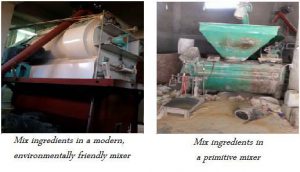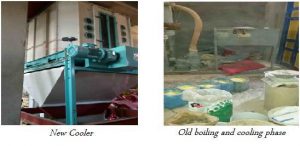Nile Feed Factory is a factory located in Kafr Saad city in Damietta governorate, which manufactures poultry feed by mixing a number of important nutrients for chicken growth. These ingredients differ in some proportions or some minor additives according to their purpose, whether for flesh or egg production.
Main Source of Pollution:
It was found through the field visits of ECO experts that the production capacity of the Nile Feed Factory in Damietta was about 65 tons / day (24000 tons / year) of poultry feed. There have also been many negative indicators of production processes:
Environmental compliance Implemented Options
To overcome these problems, it was found that all production processes must be adapted technologically and environmentally from the process of receiving and purifying raw materials, crushing and grinding of corn, mixing, compressing, cooling, granulating processes and finally automatic filling.
It is also necessary to replace the current steam boiler, which contributes significantly to the loss of about 25% of energy, with another modern and environmentally friendly boiler to save losses and reduce emissions.
Environmental and Economic Benefits
Environmental benefits:
Investment Cost: EGP 3,000,000.
Economic Returns: 1.1 million LE annually.
Return Period: 33 month.


Obour Land is the fourth largest white cheese producer in Egypt. The company is producing for the local and export market. Obour Land employs 250 permanent employees working in two shifts, seven days/week.
Environmental compliance Implemented Options
Environmental and Economic Benefits
| Options | Environmental benefits | Economic saving / year(EGP) | Investment t/(EGP) | Pay-back period (months) |
|---|---|---|---|---|
| Replacement of the manual cutting and packaging with automatic system | BOD reduction: 17 t/year | 500,000 | 2,000,000 | 48 |
| Boiler fuel switch to natural gas | CO2 reduction: 633,000 t/year SO2 reduction: 20 t/year |
131,000 | 90,000 | 8 |
| Total | 631,000 | 2,090,000 | 40 |
Should you have any queries .. We are here to help
Contact us